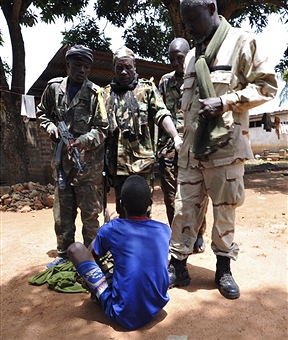
By Natalia Taylor Bowdoin, AIUSA’s Central African Republic (CAR) Country Specialist
While the world recently celebrated when Bosco Ntaganda turned himself into the U.S. Embassy in Kigali and asked to be delivered to the International Criminal Court, a precarious human rights and humanitarian tragedy was unfolding in another little known corner of Central Africa, the Central African Republic (CAR). On Sunday, the rebel group, Seleka, succeeded in toppling the CAR government, sending the president, François Bozizé, into exile and the citizens of the country into crisis yet again.
CAR watchers were hardly surprised by this turn of events. Bozizé himself came to power through a coup in March 2003, ousting then-president Ange-Félix Patassé with the help of his Chadian friends. Shortly after coming to power however, many of his Chadian helpers became disgruntled. They and former supporters of Patassé split from the government, and along with other disparate elements in northern CAR, began to take to arms and form rebel groups. These rebels groups alternated between terrorizing, harassing and occasionally offering protection to local populations in exchange for loyalty and at great cost. The majority of the rebel groups agreed to come to peace talks in 2007 and 2008 with the Bozizé government and together they ironed out a path forward. Unfortunately, that path didn’t hold for long.
In December last year, five rebel groups from Northern CAR, came together to form the über-rebel group Seleka (meaning “the alliance” in Sango, the national language of CAR) and began rapidly taking over towns in north and central CAR, claiming that Bozizé had failed to live up to the 2007/08 peace deals. After calling for help from France and the U.S. and receiving none, Bozizé got spooked enough to agree to talks and a power sharing deal which would incorporate the Seleka rebels, the political opposition and civil society leaders. He also agreed to do things that he just couldn’t seem to follow through with (like releasing political prisoners and sending South African troops home).
Worsening Humanitarian Crisis
Sunday’s coup thus seemed inevitable as Seleka renewed its war cry last week after denouncing Bozizé for failing to honor his part in the January peace deal. But the rapid ouster of Bozizé and the taking of the capital by the Seleka rebels has meant that the citizens of CAR – already suffering from a decade of insecurity and bad governance, a precarious humanitarian situation and a looming agricultural shortage – are at even greater risk of a human rights abuses and a serious humanitarian crisis.
When Seleka took the capital, Bangui, widespread looting occurred and the electricity was cut – leaving residents, hospitals, stores, and municipal buildings in the dark. Many residents who fled the city for safety in the bush have still not been heard from by their families and loved ones living abroad. Electricity remains unavailable in most parts of Bangui and looting continues. Relief access to affected populations (both in Bangui and in other towns controlled by Seleka) remains extremely difficult. Food and water are inaccessible to many.
Human Rights at Risk
CAR has a new self-proclaimed president from among the Seleka rebel leaders, Michel Djotodia, and Bozize is in temporary exile in Cameroon. Divisions are already emerging within the Seleka coalition, with another rebel leader, Nelson N’Djadder, seemingly vying for power. In an attempt to prevent the division from blowing the whole rebel coalition wide open, Djotodia has announced he will name a power-sharing government, stick to the terms of the original January peace deal (minus Bozizé as President), allow Nicolas Tiangaye (a well-respect human rights lawyer and leader of the civilian opposition) to remain in place as prime minister and work toward democratic elections in two or three years.
Despite this plan, there are serious concerns over how well Seleka will respect and protect the human rights and civil liberties. Given the track record of members of Seleka who formerly belonged to the rebel groups who waged war on the government from 2004-2007 and who are not known for their respect for human rights,reprisals against members of the former Bozizé government seem foregone. Over the past few months, reports of vigilante groups made up of young Bozizé supporters harassing, intimidating and abusing people in the capital have become common. Tension will be high between the new Seleka authorities and these vigilante groups and other citizens supportive of the former Bozizé regime.
A Call to the Seleka Coalition
Bozizé – not known for his spotless human rights record – may be gone, but his legacy and the manner of his ousting have put the Central African people at much greater risk of a humanitarian catastrophe and paved the way for more turmoil and uncertainty to come. The Seleka coalition must control their members and end the current chaos. They must ensure the protection of civilians and make clear to its members that human rights violations will not be tolerated and that perpetrators will be brought to justice. The Central African people deserve that at the very, very least. It is time for a better future for the citizens of the Central African Republic.
